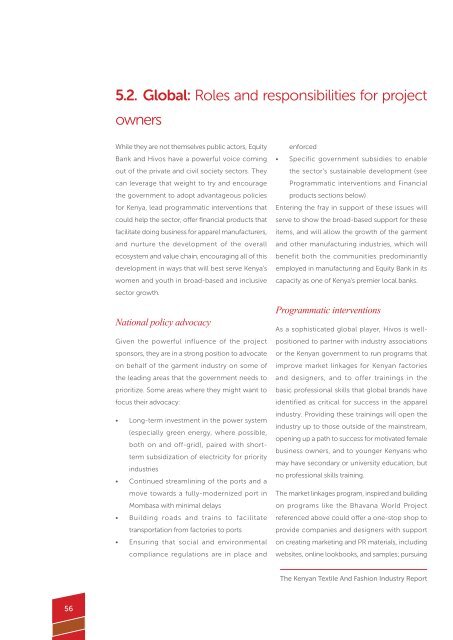You also want an ePaper? Increase the reach of your titles
YUMPU automatically turns print PDFs into web optimized ePapers that Google loves.
5.2. Global: Roles and responsibilities for project<br />
owners<br />
While they are not themselves public actors, Equity<br />
Bank and Hivos have a powerful voice coming<br />
out of the private and civil society sectors. They<br />
can leverage that weight to try and encourage<br />
the government to adopt advantageous policies<br />
for Kenya, lead programmatic interventions that<br />
could help the sector, offer financial products that<br />
facilitate doing business for apparel manufacturers,<br />
and nurture the development of the overall<br />
ecosystem and value chain, encouraging all of this<br />
development in ways that will best serve Kenya’s<br />
women and youth in broad-based and inclusive<br />
sector growth.<br />
National policy advocacy<br />
Given the powerful influence of the project<br />
sponsors, they are in a strong position to advocate<br />
on behalf of the garment industry on some of<br />
the leading areas that the government needs to<br />
prioritize. Some areas where they might want to<br />
focus their advocacy:<br />
• Long-term investment in the power system<br />
(especially green energy, where possible,<br />
both on and off-grid), paired with shortterm<br />
subsidization of electricity for priority<br />
industries<br />
• Continued streamlining of the ports and a<br />
move towards a fully-modernized port in<br />
Mombasa with minimal delays<br />
• Building roads and trains to facilitate<br />
transportation from factories to ports<br />
• Ensuring that social and environmental<br />
compliance regulations are in place and<br />
enforced<br />
• Specific government subsidies to enable<br />
the sector’s sustainable development (see<br />
Programmatic interventions and Financial<br />
products sections below)<br />
Entering the fray in support of these issues will<br />
serve to show the broad-based support for these<br />
items, and will allow the growth of the garment<br />
and other manufacturing industries, which will<br />
benefit both the communities predominantly<br />
employed in manufacturing and Equity Bank in its<br />
capacity as one of Kenya’s premier local banks.<br />
Programmatic interventions<br />
As a sophisticated global player, Hivos is wellpositioned<br />
to partner with industry associations<br />
or the Kenyan government to run programs that<br />
improve market linkages for Kenyan factories<br />
and designers, and to offer trainings in the<br />
basic professional skills that global brands have<br />
identified as critical for success in the apparel<br />
industry. Providing these trainings will open the<br />
industry up to those outside of the mainstream,<br />
opening up a path to success for motivated female<br />
business owners, and to younger Kenyans who<br />
may have secondary or university education, but<br />
no professional skills training.<br />
The market linkages program, inspired and building<br />
on programs like the Bhavana World Project<br />
referenced above could offer a one-stop shop to<br />
provide companies and designers with support<br />
on creating marketing and PR materials, including<br />
websites, online lookbooks, and samples; pursuing<br />
The Kenyan Textile And Fashion Industry Report<br />
56


